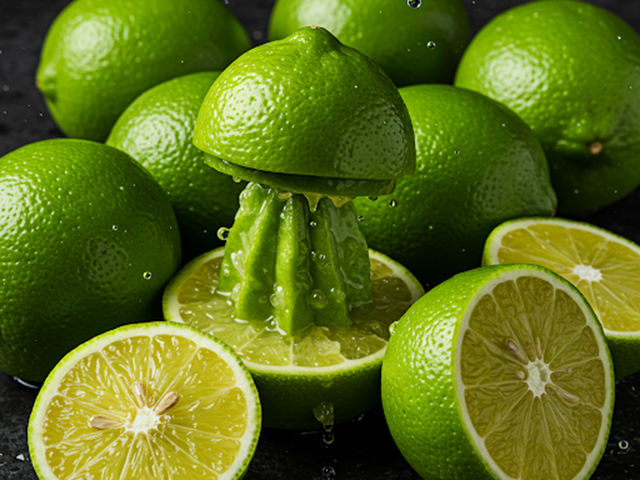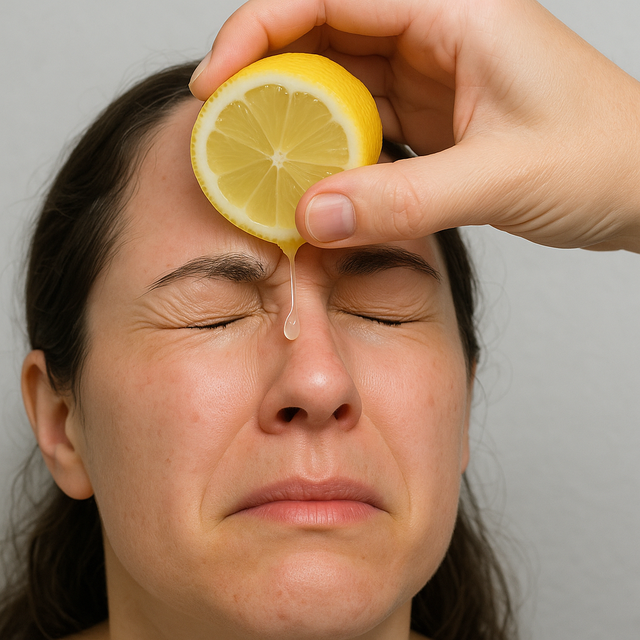Master - Specialist Doctor 1 Truong Tan Phat, Head of the ENT Unit, Tam Anh General Hospital, said that the nasal and throat mucosa is very thin and sensitive, the acid from lemon juice can cause burns, swelling, and mucosal congestion, and if it is inflamed, it can make the inflammation worse.
If you have allergic rhinitis or sinusitis, applying lemon juice will not only not cure the disease but also cause severe irritation, making the disease last longer. In many cases, patients see "fluid flowing out" when applying lemon juice, which is effective, but this is an inflammatory reaction due to irritated mucous membranes; or in some cases, the disease does not improve but becomes more severe.

The acid from lemon can cause burns, swelling, and mucosal obstruction.
Photo: AI
Treat sinus by dropping pure lemon juice into the nose
Ms. KM (27 years old, in Tien Giang ) came to Tam Anh General Hospital Clinic, District 7, Ho Chi Minh City, with swollen nasal mucosa, burning sensation, runny nose, and prolonged nasal congestion.
Ms. M. has chronic sinusitis, often suffering from sinusitis when the weather changes, or when in a cold environment, so she also looked for more ways to treat the disease. 3 weeks ago, reading information from groups on social networks and seeing many people's effective responses, she also tried treating sinusitis by dropping 3 drops of pure lemon juice into her nose every morning.
The first two days, when she put lemon in her nose, she felt extremely sore and irritated her nasal mucosa, and there was no runny nose like many other people. She went to a social networking group to ask for more advice and was instructed to put in more drops and increase the frequency. She did as she was told, but then her nose became more sore, swollen, painful, and felt hot and uncomfortable, with a runny nose that kept running, accompanied by fatigue, insomnia, and exhaustion. She did it for more than a week and found it ineffective, so she stopped.
The symptoms still persisted until now. Ms. M. coughed up green pus and read information in the newspaper about the dangers of this so she rushed to see a doctor.

Do not put lemon juice directly into the eyes.
Illustration: AI
Through clinical examination and nasopharyngeal endoscopy, Dr. Phat noted that Ms. M's nasal mucosa was congested and edematous. The mucosal surface had many areas of slight sliding lesions, signs of frequent contact with irritants (acid from lemon); a lot of mucus, green-yellow pus. The sinus openings were edematous, blocked, obstructing sinus drainage, showing signs of ethmoid sinusitis and bilateral maxillary sinusitis.
Dr. Phat diagnosed Ms. M. with acute chronic sinusitis and chemically induced rhinitis. “Chemically induced rhinitis is when the nasal mucosa is damaged by an external chemical agent, in this case the acid in lemon; different from allergic rhinitis (due to the body), or rhinitis caused by viruses/bacteria (infections),” Dr. Phat said.
Dr. Phat suctioned mucus to help clear Ms. M's sinuses, prescribed medication, gave instructions on how to care for her nose during the sensitive period, and scheduled a follow-up appointment 1 week later for monitoring.
Add lemon juice to “clean eyes, brighten eyes”
Another case is that of KLP (2 years old) whose eyes were often red and itchy, so her grandmother followed the “folk remedy” of dropping lemon juice to “clean the eyes and brighten the eyes”. The baby was dropped about 2-3 drops of pure lemon juice into the left eye. The baby cried out, felt pain and burning in the eyes, and tears flowed continuously. Afterwards, the baby was washed with saline solution but the symptoms did not improve.
Coming home from work, knowing the incident, baby P's parents rushed their child to Tam Anh General Hospital in Ho Chi Minh City. Through clinical examination, specialist doctor Nguyen Duc Huy found the baby's eyelids slightly swollen, the conjunctiva red (diffuse conjunctival congestion). Using a slit lamp, he recorded corneal epithelial damage, scattered epithelial peeling. Doctor Huy diagnosed the baby with acute keratoconjunctivitis due to chemical irritation (acid from lemon juice), corneal epithelial damage.
Dr. Huy explained that lemon juice contains citric acid, which can damage the body's cells and cause acid burns. If dropped into the eyes, it will directly damage the cornea, causing the risk of ulcers, especially in young children, and can cause corneal scarring and even corneal perforation, leading to permanent blindness.
“A few years ago, there was also a natural trend of using colostrum to drop eye drops for babies. There was a case of a child with a total corneal opacity. When he went to see a doctor, his eyes were almost beyond recovery, meaning he was almost completely blind,” said Dr. Huy.
Many people think that lemon is a natural ingredient and therefore safe. However, natural does not mean safe when used incorrectly or for the wrong purpose. The misconception that natural is safe is a trap. Using it incorrectly not only does not cure the disease but can also cause complications, costing many times more than the initial treatment.
Dr. Huy also recommends that to introduce an external factor into the body, it is necessary to go through many studies, tests, and preparation of appropriate dosage and concentration. Do not put any foreign substance into the eyes, nose, or ears, because it can easily cause inflammation and serious damage.
Source: https://thanhnien.vn/len-mang-tim-hieu-roi-nho-nuoc-cot-chanh-vao-mat-mui-gay-bong-bien-chung-nang-185250503125501633.htm


































































































Comment (0)